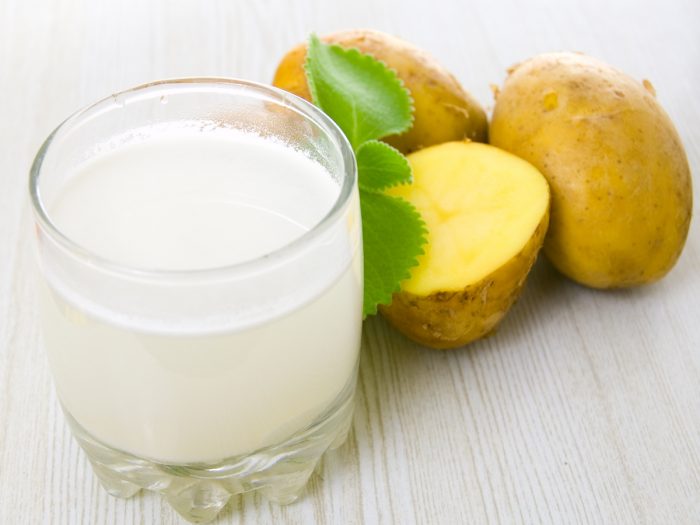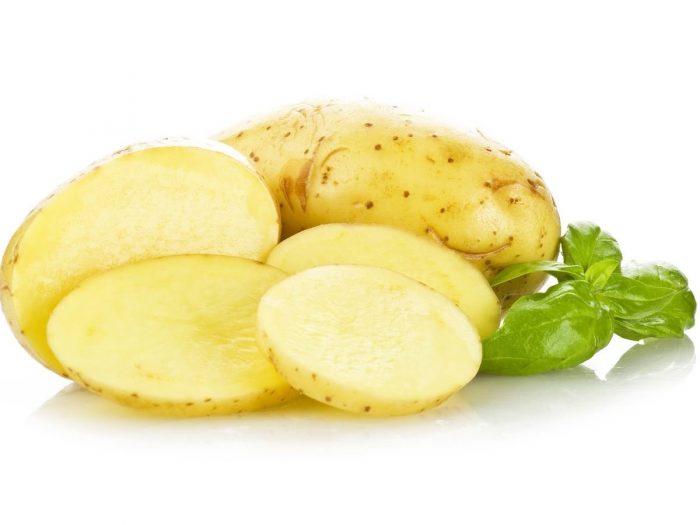Most people have never considered drinking a tall glass of potato juice, but the impressive health benefits of this unusual vegetable juice may surprise you. Made from the starchy tuber of the Solanum tuberosum plant, potato juice has been used all over the world for centuries. While the flavor is rather unappetizing and starchy inconsistency, it may be an excellent juice to mix with other vegetable juices for a nutrient-dense drink.
Potato Juice Nutrition Facts
Potato juice offers a wealth of nutrients, including vitamin C, potassium, various B vitamins, calcium, iron, phosphorus, copper, and sulfur, among other phytonutrients and organic compounds. Interestingly enough, most of the nutrients in a potato are in the skin, so it is important that you do not peel potatoes when making your juice at home. [1]
Potato juice due to the presence of many nutrients has an impressive list of health benefits. Let’s look at some of the benefits in detail.
Benefits of Potato Juice
The most impressive health effects of potato juice may include preventing aging, aiding digestion, healing ulcers, supporting the liver, improving circulation, regulating hormone production, among others.
May Prevent Aging
Research has shown that potato juice is able to moisturize the skin and deliver antioxidants to the surface of the skin, which can help reduce the appearance of wrinkles and age spots, while also protecting against inflammation and skin infections. [2]
May Boost Energy Levels
Potato juice is an excellent energy booster, as the natural sugars found in this juice are easy forms of energy. Furthermore, it has potentially high levels of thiamine, which can improve the body’s ability to break down carbohydrates into usable energy. [3]
May Help Improve Digestion
The starch content of potato juice has been linked to a number of digestive issues and can help soothe inflammation in the gut and promote digestion, eliminating symptoms of constipation, bloating, cramping, and indigestion. [4]

Potato juice is rich in vitamin C. Photo Credit: Shutterstock
May Treat Ulcers
Potato juice has well-known antacid properties and has a slightly alkaline pH. This can help balance the acidity in your gut and prevent/treat gastric ulcers. It can form a protective layer on the mucosal lining of the stomach to relieve the pain and discomfort of this common condition as it heals. [5]
May Improve Heart Health
There is a significant amount of potassium in a single glass of potato juice, more than 50% of your daily required intake. This means that starting your day with a glass of this juice may reduce the strain on your cardiovascular system by easing tension on blood vessels and arteries, thus lowering your blood pressure. [6]
May Boost Immunity
Potato juice is potentially rich in vitamin C and can boost immunity by stimulating the production of white blood cells. Other antioxidants and immunostimulant minerals also protect against chronic disease and lower oxidative stress. [7]
May Speed up Wound Healing
Potato juice is rich in vitamin C that helps stimulate the production of collagen and in turn speed up the healing of wounds and sore muscles. [8]
May Help Improve Circulation
Niacin is another member of the B family that is found in high levels in potato juice. This vitamin can stimulate circulation, which will improve oxygenation in different parts of the body, along with the delivery of necessary nutrients for repair and normal function. [9]
May Improve Hormone Production
Regular consumption of potato juice may help in improving levels of important sex and stress hormones. [10]
May Detoxify Liver & Gallbladder
The active ingredients in potatoes can help flush out the liver and gallbladder, two of the major detoxifying centers in the body. This, in turn, helps improve the overall health of the body. [11]
How to Make Potato Juice?
Potato juice requires a bit more effort than most vegetable and fruit juices but the juice is definitely worth the squeeze. Again, your immediate urge will be to peel the potatoes, but avoid this, as you will get many more nutrients if you leave it on. In the case of potatoes, you will want to scrub them particularly well, and be sure to cut out any bruises or deep notches of dirt, as well as “eyes”.

Detoxifying Potato Juice Recipe
Ingredients
- 2 potatoes large
- 2 cups water
- other vegetables (celery, spinach, cabbage) optional
Instructions
- Ensure that potatoes are thoroughly scrubbed and clear of eyes and bruising.
- Chop the potato into smaller chunks, leaving the skin on.

- Add potato and water to the processor and process for 2-3 minutes.
- Strain the blended material through a sieve or cheesecloth to remove the juice.
- Press the potato pulp or squeeze the cheesecloth to extract as much juice as possible.
- Refrigerate the potato juice for 2-3 hours. Stir well before serving chilled and enjoy!

Notes
Potato Juice for Skin
Using this juice for skin health is very popular as it can clear up a huge variety of skin conditions, including dry skin, wrinkles, age spots, inflammation, and wounds. Potato juice helps retain moisture in the skin and clears up flaking, dry skin rapidly.
It can even soothe conditions like psoriasis, eczema, rosacea, and acne, and prevent and protect skin against infections, thanks to its rich supply of nutrients and vitamins.
Potato Juice for Hair
Using potato juice improves hair health and prevents dandruff, inflammation, and dryness on the scalp. By massaging this juice onto the hair from root to tip, you also improve the luster and strength of the strands, preventing split ends and boosting the shine. After applying it to the hair, allow it to sit for 10-20 minutes before washing it out with warm water. [12]
Side Effects of Potato Juice
Despite all of these impressive health benefits, potato juice can have some negative side effects, including gastrointestinal distress or elevated blood sugar levels. However, these side effects are generally experienced by people who prepare the potato juice incorrectly or drink it in excess. Generally, there are no negative side effects of drinking this vegetable juice.
Diabetes: Potato juice does have a high level of natural sugars, which can be dangerous for anyone with blood sugar issues, such as diabetics. Intake should be moderate in every case but diabetic patients should be especially careful about the glucose-raising qualities of this juice. [13]
Stomach Issues: Preparing this juice with the right potatoes is key, which means that there should be no eyes or pits in the potatoes you blend. There are certain toxins in fresh green shoots of potatoes that can cause diarrhea, stomach upset and nausea, so only clean and fresh potatoes should be used to make this juice.

